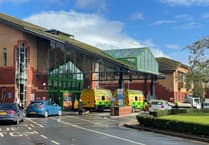THERE was a report published this week of a national rise in the number of coronavirus (Covid-19) cases, with the highest rates currently in the South West of England.
It took data from the ZOE health app, which indicates that there are between 931 and 1,628 new cases per million people, every day in the South West, with a 30 per cent rise overall in daily cases since the start of July.
On the face of it, that sounds quite significant, but the overall levels are very low, says Public Health Devon.
Simon Chant, Public Health Devon’s data expert, explains: “Really, what we’re seeing is the regular ebb and flow of coronavirus cases in the UK, which has been present and will be present for some time to come.
"While a headline grabbing '30 per cent rise’ sounds like a lot, it’s from a relatively low baseline at the start of July, and therefore we shouldn’t read too much into it at this point.
"It is however an important reminder to us all that coronavirus hasn’t gone away, and that we need to keep an eye on it.”
As more is known now about coronavirus, and as the virus itself has evolved and changed over time, there are now more symptoms attributed to Covid-19.
The NHS website lists the current symptoms and has advice for people who may have them. (https://www.nhs.uk/conditions/covid-19/covid-19-symptoms-and-what-to-do/ )
It also has advice for people who test positive, although you are no longer required to do a Covid-19 rapid lateral flow test if you have symptoms. (https://www.nhs.uk/conditions/covid-19/covid-19-symptoms-and-what-to-do/ )


